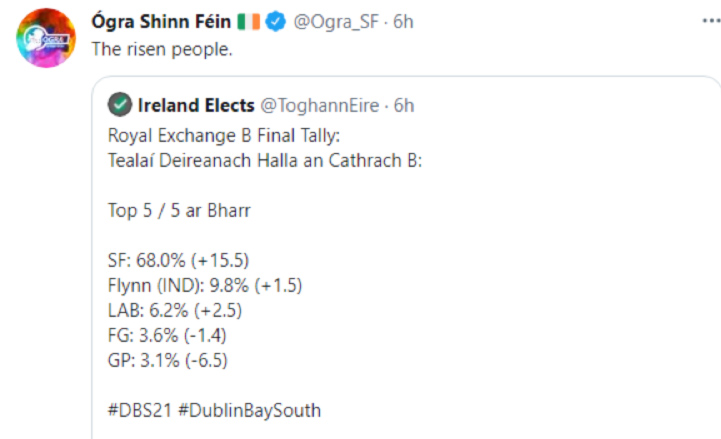The slightly higher turnout in Ringsend and Pearse Street as compared to the places where people dress up for dinner, apparently, had some pundits predicting that Lynn Boylan of Sinn Féin was going to emulate Mark Ward in Dublin Mid West.

Alas, if only the count had stopped after a tenth of the votes had been tallied. Such things may, of course, be difficult to grasp on the part of persons who in some cases still think that Sinn Féin won the last general election with 24.5% of the vote. It’s just not fair, so it’s not. Anyway, if all keeps fine someday, like their heroes in Havana and Beijing, the only elections will be among themselves.
Sinn Féin will pretend now of course that it was a good result and that many people chose Ivana in preference to them because they are “posh” and that Labour says the same things more or less as the Shinners anyway. Just without the Scottish soccer tops.
So like when they got thrashed by Michael D. in the Presidential elections they can claim some vicarious part in the victory of another candidate who let’s face it could be in the Shinners and probably would be had she been born a few years later. It is of course also true that Labour’s dreadful record in government and almost complete non existence in working-class parts of Dublin will mean that Sinn Féin is still best placed to be top of the Woke polls in the next general election.
What ought to be of more concern to them is how badly they did in an election which came at a time that ought to have been perfect for any opposition party with ambitions to power. And yet not only did 2,116 fewer people vote for Sinn Féin than just 18 months ago (their % vote also declined, so turnout is not the reason), but the Fine Gael share of the vote only fell by 1.5%
It rather undermines their claim to be the only viable contender with Fine Gael to be the biggest party of government whenever the next general election is held.
And this on a day when Fianna Fáil, whose dwindling support has contributed greatly to Sinn Féin’s rise, experienced its single worst electoral performance in its entire history, dating back 95 years. Over 4,000 fewer voters plumped for Fianna Fáil than in February 2020, but Sinn Féin abysmally failed to take advantage of this as they have done on other occasions.
There will be much recrimination you can be certain. Many of the old guard have occasionally expressed unease at the headlong embrace by the newer Sinn Féin of ultra-liberalism. That surfaced following the poor election performance in 2007, and again after the disaster of the 2018 Presidential election and the loss of a huge proportion of their vote in the 2019 local and European elections.
The 2020 general elections salved some of that doubt, and the liberal left were again given their head. With the consequence that they have gotten carried away with themselves, as evidenced by their picketing of a Catholic Church recently. If they believe that this does not disturb many people who consider themselves to be republicans, then perhaps they might think again. Those most likely to be thus impressed by this sort of thing will always choose people like Bacik above Sinn Féin.
The Sinn Féin inquiry will also be focused on how a saturation level campaign coming at a time when the government is staggering from one shambles to the next, actually succeeded in persuading 2,000 former Sinn Féin voters either to vote for someone else, or not to bother voting at all. That, as they say, is the key take away.
 |
| File Image: Lynn Boylan debating in the EU Photo Credit: EU Parl CC licence |
Sinn Féin had certainly invested huge resources into the campaign, bringing all available recognisable faces in as part of an intensive flooding of parts of the constituency they believed would provide them with a sufficient platform to take the seat.
This expectation was further added to when the first boxes showed Boylan heading the poll by quite a distance. This led the younger element in Sinn Féin to take time off tweeting their favourite Marxist monsters to celebrate what it must seemed to them to have been the beginnings of a Castro-like landslide.
This expectation was further added to when the first boxes showed Boylan heading the poll by quite a distance. This led the younger element in Sinn Féin to take time off tweeting their favourite Marxist monsters to celebrate what it must seemed to them to have been the beginnings of a Castro-like landslide.

Alas, if only the count had stopped after a tenth of the votes had been tallied. Such things may, of course, be difficult to grasp on the part of persons who in some cases still think that Sinn Féin won the last general election with 24.5% of the vote. It’s just not fair, so it’s not. Anyway, if all keeps fine someday, like their heroes in Havana and Beijing, the only elections will be among themselves.
Sinn Féin will pretend now of course that it was a good result and that many people chose Ivana in preference to them because they are “posh” and that Labour says the same things more or less as the Shinners anyway. Just without the Scottish soccer tops.
So like when they got thrashed by Michael D. in the Presidential elections they can claim some vicarious part in the victory of another candidate who let’s face it could be in the Shinners and probably would be had she been born a few years later. It is of course also true that Labour’s dreadful record in government and almost complete non existence in working-class parts of Dublin will mean that Sinn Féin is still best placed to be top of the Woke polls in the next general election.
What ought to be of more concern to them is how badly they did in an election which came at a time that ought to have been perfect for any opposition party with ambitions to power. And yet not only did 2,116 fewer people vote for Sinn Féin than just 18 months ago (their % vote also declined, so turnout is not the reason), but the Fine Gael share of the vote only fell by 1.5%
It rather undermines their claim to be the only viable contender with Fine Gael to be the biggest party of government whenever the next general election is held.
And this on a day when Fianna Fáil, whose dwindling support has contributed greatly to Sinn Féin’s rise, experienced its single worst electoral performance in its entire history, dating back 95 years. Over 4,000 fewer voters plumped for Fianna Fáil than in February 2020, but Sinn Féin abysmally failed to take advantage of this as they have done on other occasions.
There will be much recrimination you can be certain. Many of the old guard have occasionally expressed unease at the headlong embrace by the newer Sinn Féin of ultra-liberalism. That surfaced following the poor election performance in 2007, and again after the disaster of the 2018 Presidential election and the loss of a huge proportion of their vote in the 2019 local and European elections.
The 2020 general elections salved some of that doubt, and the liberal left were again given their head. With the consequence that they have gotten carried away with themselves, as evidenced by their picketing of a Catholic Church recently. If they believe that this does not disturb many people who consider themselves to be republicans, then perhaps they might think again. Those most likely to be thus impressed by this sort of thing will always choose people like Bacik above Sinn Féin.
The Sinn Féin inquiry will also be focused on how a saturation level campaign coming at a time when the government is staggering from one shambles to the next, actually succeeded in persuading 2,000 former Sinn Féin voters either to vote for someone else, or not to bother voting at all. That, as they say, is the key take away.








No comments